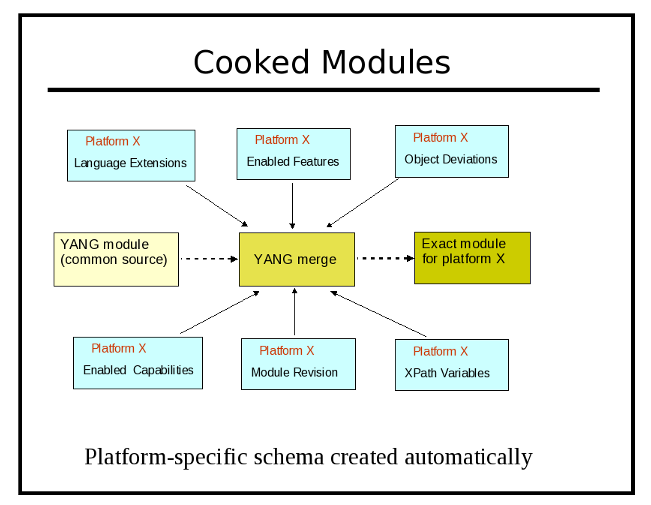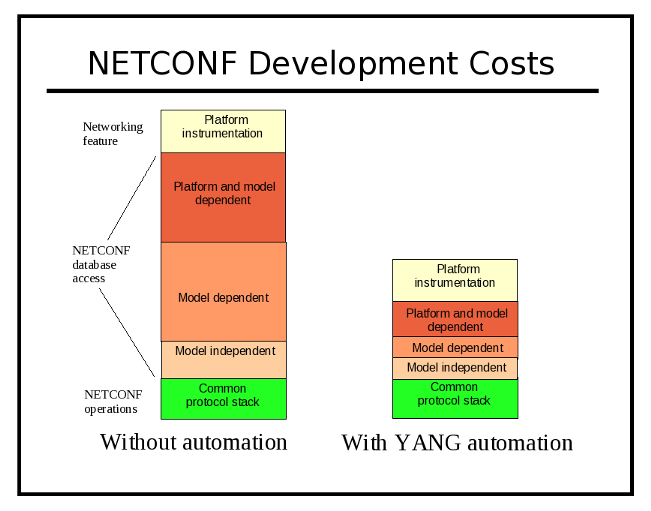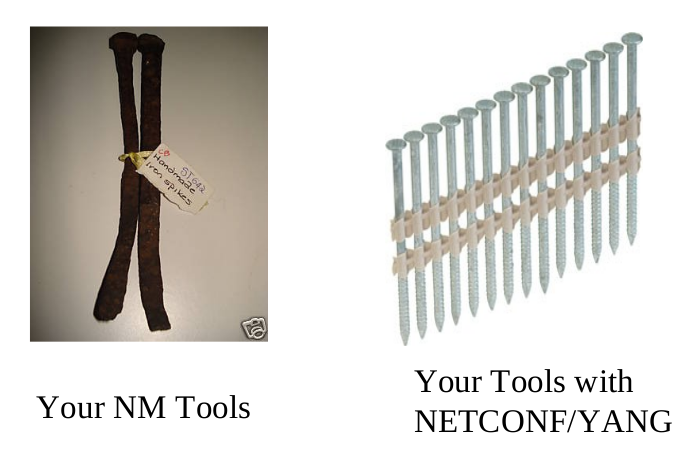Help
Help here
YANG Based Automation

Cooked YANG Modules
One of the most significant costs in network configuration management is the ad-hoc, manual, and trial-and-error approach to platform specific customization (and bugs).
The YANG language includes several features to enable tools to automate many of the software development tasks associated with platform or implementation specific details.
A cooked module is the conceptual composite of a common YANG source file and a set of parameters for a particular agent implementation. A manager application can use a cooked module to perform offline database validation, tailor management operations, control user interface features, etc.
There are six mechanisms available in YANG to support this sort of automation:
- YANG language extensions
- Enabled module features
- Platform specific object deviations
- Platform enabled NETCONF capabilities
- Supported module revision
- Platform-specific XPath variables for must/when
Extensions
Language extensions allow developers to annotate the YANG source file with tool directives of arbitrary complexity. However, conditional directives, such as '#ifdef' is C are not supported. An example of YANG language extensions can be found in the module ncx.yang.
Features
The YANG 'feature' mechanism allows a module to be partitioned into mandatory and optional sections. Any number of 'if-feature' statements can be combined (i.e., simple AND expression) to allow complex conditional objects to be specified.
At runtime, the agent specifies which features are supported for each module (in the module <capability> URI). Tools can automatically include/exclude module-related code based on the 'feature list' for the platform, and automatically generate the <hello> message for each session.
Deviations
YANG provides an extensive 'deviations' mechanism to allow an implementation to identify exactly how a particular data model object is implemented, even if it deviates dramatically from the standard definition.
At YANG module set processing time, a tool can automatically patch the deviations into the internal YANG module representation. The composite module can be constructed by the manager application, using the deviations information in the module <capabilities> advertised in each <hello> message.
Capabilities
Vendor-specific NETCONF capabilities can always be used if desired, or if no YANG mechanism is available to provide the correct tool behavior. Language extensions could be used in conjunction with vendor capabilities to associate portion(s) of the data model with the NETCONF capability.
Similar to features, a tool can utilize vendor capabilities to tailor automatically generated code for supporting the YANG module on different platforms.
Revision
The exact revision date of each module is advertised in the module <capabilities>. YANG allows multiple versions of the same 'library' modules to be used concurrently within the agent, via the 'import-by-revision' feature.
Tools can maintain a library of all known module versions, and construct the exact module set used by a particular agent, using the module information in the <hello> message.
XPath Variables
YANG provides two XPath-based mechanisms to specify multi-object constraint conditions. The 'must' statement is used to specify the conditions that must be true for an instance of the object containing the must statement(s) to be considered 'valid'. The 'when' statement is used to specify the conditions that must be true for the object itself to be considered supported by the agent.
XPath supports user variables which can be used in 'must' or 'when' expressions. An agent can utilize a platform-specific set of XPath variables, during normal automatic processing of all 'must' and 'when' statement validation.

NETCONF Development Costs
Another source of significant costs in network configuration management is the labor-intensive nature of data model agent implementation on multiple product platforms.
There are three basic types of code within the agent implementation for a particular data model module:
-
Networking feature:
This code performs the actual operations/behavior indicated by the configuration database contents (e.g., turn the fan motor on or off). This code would be the same cost regardless of the management protocol that is used. -
NETCONF database access:
This code handles all the protocol operation access to the data model content in all of the NETCONF databases. Most of the development costs are found here, due to complex validation, creation, deletion, editing, filtering, commit and rollback requirements imposed by the protocol. The platform-dependent development costs are the highest, and they are also the source of divergence between implementation behavior for the same data model. -
NETCONF operations:
This code handles the NETCONF protocol operation processing which is unrelated to data models, such as session support, XML message handling, error reporting, and transport mappings. Due to the significant complexity, but universal applicability, this code is often available in 'toolkits', so the cost is relatively low, compared to the rest of the agent implementation.
